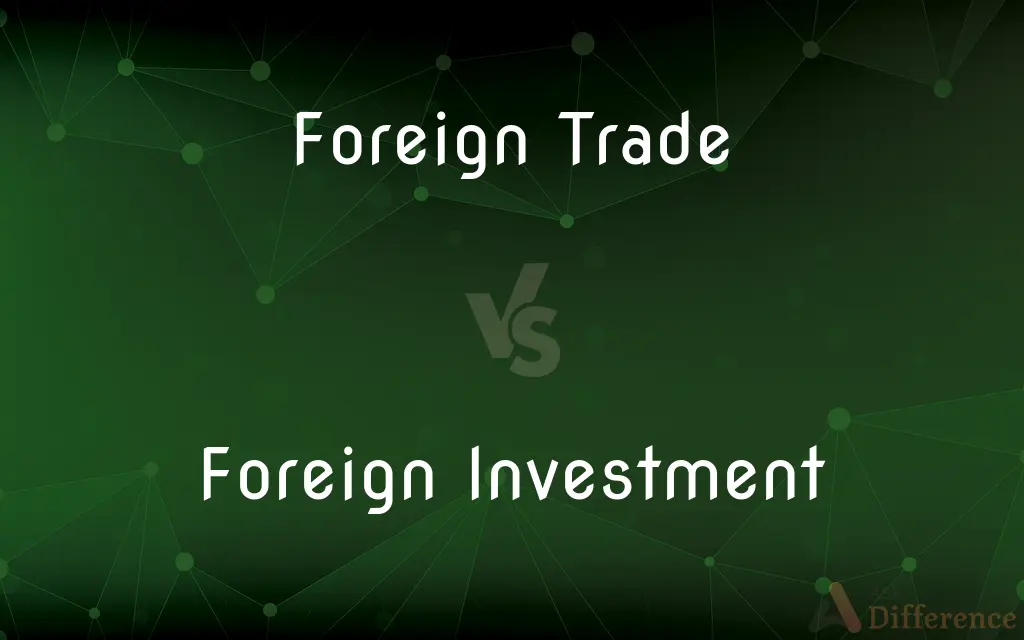Foreign Trade vs. Foreign Investment — What's the Difference?
By Tayyaba Rehman — Published on October 21, 2023
Foreign Trade is the exchange of goods and services across international borders. Foreign Investment is the allocation of capital by individuals or entities from one country into assets or projects in another.

Difference Between Foreign Trade and Foreign Investment
Table of Contents
ADVERTISEMENT
Key Differences
Foreign trade refers to the import and export of goods and services between countries. Foreign investment, on the other hand, involves the allocation of capital by individuals, companies, or governments from one country to acquire assets or invest in projects located in another country.
Foreign trade involves the exchange of products or services across international borders, either for sale or consumption. Foreign investment encompasses various forms, including foreign direct investment (FDI), portfolio investment, and foreign aid.
Foreign trade can take place through various means, such as trade agreements, tariffs, or free trade zones. It is primarily focused on the movement of tangible and intangible items between nations to meet consumer demands, expand market reach, or optimize production costs. Foreign investment serves the purpose of acquiring ownership stakes, generating returns on investments, or contributing to the economic development of the host country. It often involves a long-term commitment and may entail risks associated with changing economic and political conditions.
Comparison Chart
Nature
Exchange of goods and services
Allocation of capital across borders
Focus
Movement of products or services
Ownership of assets or participation in projects
ADVERTISEMENT
Key Participants
Businesses, traders, governments
Individuals, companies, governments
Purpose
Meet consumer demands, expand markets
Generate returns, acquire ownership stakes
Time Horizon
Short-term transactions
Often involves a long-term commitment
Compare with Definitions
Foreign Trade
The cross-border exchange of goods and services.
International trade boosts economic growth through foreign trade.
Foreign Investment
The commitment of funds in overseas ventures.
Foreign investment can lead to global business expansion.
Foreign Trade
International sale and purchase of products.
Tariffs can impact the cost of foreign trade.
Foreign Investment
Capital deployment in foreign markets.
Foreign investment can involve direct ownership stakes.
Foreign Trade
Commercial transactions across international borders.
Globalization has expanded opportunities for foreign trade.
Foreign Investment
Investing in projects or assets outside one's home country.
Foreign investment can enhance a company's competitiveness.
Foreign Trade
Importing and exporting between countries.
Foreign trade agreements facilitate global commerce.
Foreign Investment
Capital allocation across national boundaries.
Foreign investment drives economic development.
Foreign Trade
The movement of goods and services globally.
Foreign trade balances can affect a nation's economy.
Foreign Investment
Investment in assets or projects abroad.
Foreign investment diversifies investment portfolios.
Common Curiosities
How can foreign trade impact a nation's economy?
It can influence factors like economic growth, employment, and trade balance.
What is foreign trade?
Foreign trade refers to the exchange of goods and services across international borders.
Why is foreign trade important?
It allows countries to access a wider range of products, expand markets, and promote economic growth.
What are common methods of foreign trade?
Importing, exporting, trade agreements, and international commerce.
What role do governments play in foreign trade?
Governments can implement trade policies, tariffs, and regulations to manage foreign trade activities.
What are the potential risks of foreign investment?
Risks include political instability, economic fluctuations, and currency exchange rate changes.
What is foreign investment?
Foreign investment involves allocating capital across borders to acquire assets or participate in projects in another country.
What are the different forms of foreign investment?
Foreign direct investment (FDI), portfolio investment, and foreign aid.
Why do individuals and businesses engage in foreign investment?
To generate returns on investments, diversify portfolios, and access new markets.
How does foreign investment contribute to economic development?
It can stimulate economic growth, create jobs, and enhance infrastructure in the host country.
Share Your Discovery

Previous Comparison
Law of Attraction vs. Law of Assumption
Next Comparison
Skeet vs. TrapAuthor Spotlight
Written by
Tayyaba RehmanTayyaba Rehman is a distinguished writer, currently serving as a primary contributor to askdifference.com. As a researcher in semantics and etymology, Tayyaba's passion for the complexity of languages and their distinctions has found a perfect home on the platform. Tayyaba delves into the intricacies of language, distinguishing between commonly confused words and phrases, thereby providing clarity for readers worldwide.














































